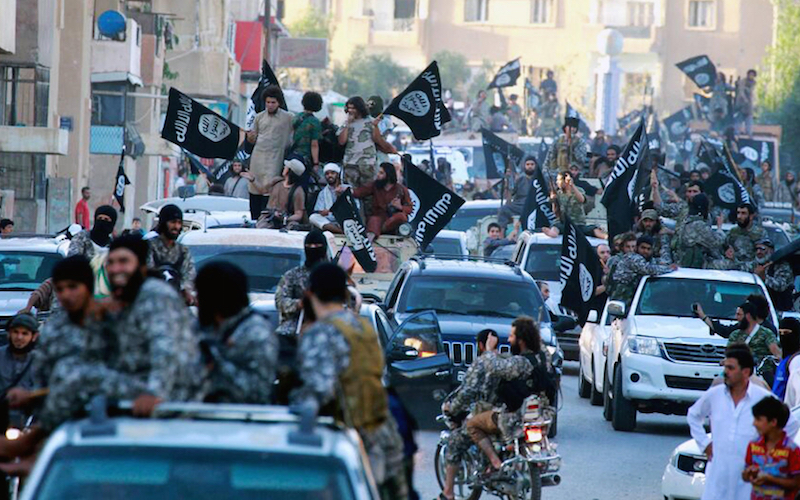
Bahrain’s Daesh Dilemma
Daesh’s commitment to establishing a “caliphate” in the Muslim world has unsettled the Persian Gulf’s Arab monarchs, who are justifiably concerned about the ramifications of Daesh’s rise to power in Iraq and Syria. The group’s leader, Abu Bakr al-Baghdadi, has called on its sympathizers to wage violent attacks throughout the Middle East and North Africa. Despite the fact that last September four Gulf Cooperation Council (GCC) states (Bahrain, Qatar, Saudi Arabia, and the UAE) joined the U.S.-led military campaign against Daesh in Syria, the reality is that a number of influential Gulf nationals support Daesh’s agenda and ideology. The potential for GCC citizens to carry out “lone wolf” attacks in the Gulf poses a grave and growing security threat that all Gulf states must address.
The monarchy of Bahrain — led by the Al Khalifa family, which has ruled the island nation for more than 200 years — faces a unique threat from Daesh. Last September, Daesh released a propaganda video containing four Bahraini members of the group walking on a desert hill, carrying Kalashnikovs, and calling on Bahraini Sunnis to abandon loyalty to the monarchy and pledge allegiance to al-Baghdadi. The video, which was released in response to Manama’s decision to join the U.S.-led bombing campaign against Daesh in Syria, accused the Al Khalifa family of having “inserted themselves as gods next to Allah” by not imposing Sharia law in Bahrain.
Bahrain’s liberal policy toward alcohol, progressive gender norms (by GCC standards), and alleged leniency toward the Shi’ite opposition have offended certain Bahraini Salafists in recent years. However, the al-Asalah Society (the dominant Salafist movement in Bahrain) has historically maintained loyalty to the ruling family, resisting the urge to participate in international movements. That may now be changing, as al-Asalah appears to be shifting its focus toward regional issues. This was underscored in 2013 when Abdelhalim Murad, al-Asalah’s MP, organized Bahraini jihadists’ travel to Syria and met with Suqur al-Sham and Liwaa Dawud, both hardline Islamist militias operating in the war-torn country.
Like other GCC states, Bahrain is concerned about its young citizens returning home from the battlefields of Iraq and Syria to challenge the ruling order in Manama.
That certain Bahraini Salafists are now referring to the Al Khalifa family as “infidels” and seeking the monarchy’s downfall is a new and troublesome development. The potential for a growing number of Sunnis to abandon loyalty to the monarchy and support Daesh would certainly intensify and further complicate the Kingdom’s already volatile sectarian landscape at a particularly sensitive time in Bahraini history.
On November 24, 2014, a bomb blast in the Shi’ite village of Deraz injured two police officers. According to an Arab security official, the blast was related to Bahrain’s Daesh supporters. The attack took place three weeks after three Saudi citizens and one Qatari linked to Daesh killed nine Shi’ites in Saudi Arabia’s Eastern Province during the end of Ashura, which coincided with al-Baghdadi’s call on Daesh’s Saudi Arabian sympathizers to target Shi’ites. The explosion in Deraz occurred in the aftermath of reports that police conducted raids in Sunni neighborhoods and found arms caches and bomb-making materials.
A Contradictory Relationship
Bahraini officials now routinely espouse harsh rhetoric condemning Daesh’s brand of political Islam. Last September, Manama sent two fighter jets to bomb the group in the Syrian cities of Raqqa, Deir al-Zor, and Hasakah. However, Manama has been lenient vis-à-vis Daesh and al-Qaeda sympathizers within Bahrain itself, even though Bahraini authorities have harshly oppressed a pro-democracy movement — having killed, tortured, and detained scores of Shi’ite dissidents since 2011. This represents a contradictory dichotomy, which may be interpreted as a de facto appeasement of these groups within the Kingdom.
Bahraini citizens are permitted to fly Daesh flags from their cars on the streets of Manama, which is odd for a country whose government tolerates no public displays of political dissent. Turki al-Binali (known to many as Abu-Sufyan al-Salami) is an influential Bahraini cleric who left Bahrain in 2013 before traveling to the Maghreb and Mosul, Iraq, to become “the imam” of Daesh. In Bahrain, al-Binali reportedly faced no interference from government officials when he recruited young Bahrainis to his extremist cause.
Before leaving Bahrain, he held a protest outside the U.S. embassy in Manama, in which attendees held al-Qaeda flags and pictures of Osama Bin Laden. In contrast to the pro-democracy rallies held by the Shi’ite opposition that typically end with tear gas and arrests, authorities permitted al-Binali to hold the demonstration without interruption. Al-Binali’s books can still be found in bookstores and libraries across the Kingdom. Bahrain’s Daesh sympathizers have bragged on the Internet about the freedom that their government provides them, in contrast to neighboring Saudi Arabia, where authorities have waged harsh crackdowns on the group’s alleged backers.
An Enemy From Within
Given this, it is not implausible to suggest that a commonality exists between Daesh supporters and the Bahraini government. The Sunni tribal structure that pledged support to the Al Khalifa family shortly after the Shi’ite uprising erupted in 2011 contains pro-Daesh figures, and members of the state security apparatus have expressed sympathy with Daesh and other Sunni extremist groups. For example, in 2013 Tariq al-Hassan, Bahrain’s chief of public security, posted a quote from Omar (Islam’s third caliph) and an extremist logo before the message was removed from the Internet. According to an anonymous Bahraini activist, al-Hassan “likes to appear sympathetic because a lot [Daesh backers] are members of the police and security forces” and the police chief “turned a blind eye to let [Sunni extremists] gather, leave the country, preach, produce, and distribute literature.”
Ironically, self-preservation may be part of the reason why the government is so lenient vis-à-vis Bahrain’s Daesh backers. Put simply, the government is afraid of alienating Sunni supporters, including certain tribes led by figures who have expressed support for Daesh, despite the group’s call to Bahrain’s Sunnis to abandon loyalty to the Khalifa family.
For decades, al-Binali’s tribe has served as a political ally of the Al Khalifa family. One of the four men who appeared in the aforementioned video was Mohammed Isa al-Binali (Turki al-Binali’s cousin), a lieutenant who defected from the Bahrain Defence Forces. In early September, three months after his defection, Bahrain’s government tweeted that he was dismissed for an unauthorized absence. Yet sources state that he became affiliated with Daesh four months prior to his defection. Last May, another cousin of Turki al-Binali, Ali Yousif al-Binali, died fighting with Daesh in Syria.
Bahrain’s policy of recruiting Sunni police officers from Jordan, Pakistan, Syria, and Yemen, and granting them citizenship, has potential to lead to further penetration of Daesh influence within the state security apparatus. These “New Bahrainis,” who were lured into joining the island Kingdom’s security organizations by higher pay compared with what they made in their native countries, were hired by the government to protect the royal family’s firm grip on power as Shi’ite unrest grew. Given that these “New Bahrainis” are not native to Bahrain, there is a risk of their loyalty shifting from the monarchy to al-Baghdadi’s “caliphate,” which could create serious security implications for the country. Not lost in the equation is the government’s effort to impact Bahrain’s sectarian demography to increase the percentage of Sunni citizens in the Kingdom. Could it all backfire?
According to an anonymous official in Manama, the answer is yes. The government source maintained that a number of the “New Bahrainis” support Daesh’s agenda and ideological framework. The Bahraini official also stated, “The threat [of Daesh] is real, the issue is very serious. These are people from within the security services, from the police and the military. We have people who want to turn Bahrain into part of the new caliphate. And they see the Al Khalifas as the enemy.”
A Delicate Balancing Act
The influence of Daesh sympathizers within the Bahraini government’s political structure has grown as a result of Manama’s authoritarian and anti-Shi’ite policies of the post-Arab Awakening era. Much as the monarchy has courted an alliance with Islamic Minbar (the local Muslim Brotherhood’s political wing) to further unite the nation’s Sunni minority behind the government as the resilient Shi’ite opposition continued to hold anti-Al Khalifa protests across the nation, the government’s leniency vis-à-vis Daesh and al-Qaeda supporters within the Sunni tribal network, as well as recruitment of the “New Bahrainis,” fit neatly into Manama’s sectarian agenda, aimed at securing the Sunnis’ long-term position of power in the Shi’ite-majority country.
Given that Daesh views the Al Khalifa family as equally despicable as the Shi’ites, the government’s policy appears to have already backfired. While the government fostered cooperative ties with extremist elements of Sunni tribes and the “New Bahrainis” to protect its hold on power, the Al Khalifa family faces the real threat of a greater number of Bahraini Sunnis abandoning the ruling monarchy and pledging allegiance to al-Baghdadi. As Bahrain is home to many Shi’ite Muslims and Western expatriates, the Gulf Arab nation appears to be a ripe target for Daesh’s ultra-violent agenda.
A variety of analysts see Bahrain’s contribution to the Western-led international military campaign against Daesh in Syria as being primarily driven by Manama’s interest in maintaining a strong military relationship with the U.S. and UK. Tensions between Bahrain and the U.S. increased last July after Tom Malinowski, U.S. Assistant Secretary of State for Democracy, Human Rights and Labor, was expelled from the country for meeting with Ali Salman, leader of al-Wefaq (Bahrain’s dominant Shi’ite opposition faction). However, after Bahrain joined the U.S.-led military campaign against Daesh, U.S.-Bahrain relations quickly rebounded, with Malinowski returning to Manama last month to express gratitude for “Bahrain’s leadership and partnership in confronting shared challenges in this region, from our longstanding security relationship to our current efforts against Daesh.” Absent from Malinowski’s statement was any criticism of the blind eye that Manama has turned to the growing influence of pro-Daesh figures within Bahrain’s state security apparatus and the Sunni tribal network that has backed the Al Khalifa family.
On Dec. 6, the British government announced that London and Manama signed a deal to build a British naval base in Bahrain, marking the UK’s first permanent military base in the Persian Gulf since its formal withdrawal in 1971. The British thus appear to sense an opportunity to capitalize on the tension between the Bahrainis and the Americans, which presumably enhances their own ability to fight Daesh in the process. While Bahraini officials have been reluctant to crack down on Daesh affiliates within the Kingdom, it was quick to bomb the group in Syria in an effort to maintain a special relationship with its Western allies at a time when it needs a reliable partner for continued arms purchases to continue its crackdown on Shi’ite dissent. These recent developments in U.S./UK-Bahrain relations indicate that Manama is being rewarded for its role in the international military campaign against Daesh.
Yet Bahrain must tread carefully. The ruling monarchy finds itself vulnerable to a resilient Shi’ite opposition and a growing current of pro-Daesh elements within the monarchy’s political and security structures. For decades the Al Khalifa family has faced its own domestic enemies within the Kingdom’s Shi’ite communities. The new anti-government currents within the Sunni communities pose a unique threat that may ultimately challenge the Al Khalifa family’s capacity to maintain its delicate balancing act. Should this new challenge grow, history may conclude that the Bahraini government’s own policies did much to exacerbate the growing crisis within its own borders.
This article was originally posted in The Huffington Post.


